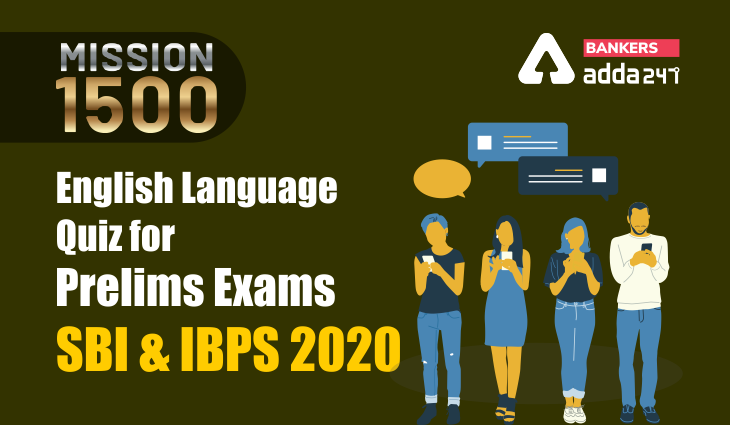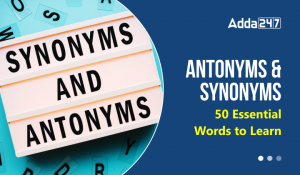
Directions (1-5): In the following passage, some of the
words have been left out, each of which is indicated by a number. Find the
suitable word from the options given against each number and fill up the blanks
with appropriate words to make the paragraph meaningfully complete.
Vikram got out of
the jungle and collected his brave soldiers. He fought against the large army.
He was defeated again. But now, he would not give up his fight. Vikram again
and again fought against the large army and finally, after many attempts
defeated the large army and (5) his kingdom. He had learnt a lesson
from the spider.
Q1.
(a) around (b)
for
(c) against (d)
versus
(e) with
Q2.
(a) blocked (b)
astonished
(c) flattened (d) defeated
(e) rejected
Q3.
(a) make (b)
weave
(c) interlaced (d) made
(e) construct
Q4.
(a) imminently (b)
completely
(c)
fortunately (d)
eminently
(e)
successfully
Q5.
(a) take (b)
expropriated
(c)regained (d) salvage
(e) retak
Directions (6-10): Rearrange the following sentences (A), (B),
(C), (D), (E), (F), and (G) in the proper sequence to form a meaningful
paragraph; then answer the questions given below them.
(A) One
singular aspect of the problem of euthanasia is the Law.
(B) It
is because intelligent people have seen that modern medical technology can be
misused wittingly or unwittingly.
(C) Before
their eyes is the picture of a man or woman for whom you can do nothing but is
still hooked onto an artificial machine.
(D) Why
is it that euthanasia is being talked about more and more these days ?
(E) It
is in situation like this that one’s deep sense of humanism and compassion
should come into play to relieve the pain and suffering.
(F) It
is more or less like keeping a corpse live.
Q6. Which
of the following should be the Sixth (LAST) sentence after the
rearrangement?
(a) A (b)
B (c) C
(d) D (e)
E
Q7. Which
of the following should be the THIRD sentence after the rearrangement?
(a) A (b)
B (c) C
(d) D (e)
E
Q8. Which
of the following should be the FIFTH sentence after the rearrangement?
(a) A (b)
B (c) C
(d) D (e)
E
Q9. Which
of the following should be the FIRST sentence after the rearrangement?
(a) D (b)
B (c) C
(d) A (e)
E
Q10. Which
of the following should be the SECOND sentence after the rearrangement?
(a) A (b)
B (c) C
(d) D (e)
F
Directions (11-15) : In each of the following sentences, a part
of the sentence has been italicized. Below are given alternatives to the part
italicized which may improve the sentence. Choose the correct alternative.
Wherever no improvement is needed choose ‘No correction required’ or ‘No
Improvement’ as the answer.
Q11. He will be greatly surprised if
he was felicitated by his staff members.
(a) if he will have felicitated
(b) unless he was felicitated
(c) if he is felicitated
(d) if he would have felicitated
(e) No correction required
Q12. Do you know when shall he be
leaving for his higher studies in the USA?
(a) should he be left
(b) he would be leaving
(c) he would be left
(d) would he have left
(e) No correction required
Q13. The labour contractors reported
that they had finished the work of building the stone wall.
(a) had been finished
(b) was finished
(c) could be finished
(d) has finished
(e) No correction required
Q14. For want of financial resources, he
was unable to continue his studies.
(a) enabled to continue
(b) unable to be continued
(c) unable to have continued
(d) unable to continuing
(e) No correction required
Q15. He complained of being unjustly
treatment.
(a) of being unjustly treated
(b) for being injustice in treatment
(c) that unjust treatment being given
(d) for being unjustly treatment
(e) No correction
required
SOLUTIONS:
S1. Ans. (c)
S2. Ans. (d)
S3. Ans. (b)
S4. Ans. (e)
S5. Ans. (c)
S6. Ans. (a)
Sol. The correct answer is DBCFEA.
S7. Ans. (c)
Sol. The correct answer is DBCFEA.
S8. Ans. (e)
Sol. The correct answer is DBCFEA.
S9. Ans. (a)
Sol. The correct answer is DBCFEA.
S10. Ans. (b)
Sol. The correct answer is DBCFEA.
S11. Ans. (c)
Sol. The if-clause should have a simple
present tense verb in this conditional sentence.
S12. Ans. (b)
Sol. ‘shall’ is used with ‘I’ and ‘we’
only, as per standard English grammar.
S13. Ans. (e)
Sol. The work had been finished at the
time that the labour contractors reported about it. So the past perfect tense
is used.
S14. Ans. (e)
Sol. ‘Unable’ (adj.) means ‘not able
to’. It is the opposite of ‘able’. ‘Enable’ (v.) is ‘to make able’.
S15. Ans. (a)
Sol. ‘Unjustly’ is an adverb meaning ‘not in a just
manner’. Here it modifies the verb ‘treated’ (‘treatment’ is noun).
Practice with Crash Course and Online Test Series for IBPS Mains 2020:
- IBPS RRB PO and Clerk Prime 2020-21 Online Test Series
- IBPS PO Online test series (Prelims + Mains) 2020 by Adda247
- IBPS KA MAHAPACK Online Live Classes
Click Here to Register for Bank Exams 2020 Preparation Material
Practice with Crash Course and Online Test Series for IBPS Clerk Prelims:



 English Language Notes for Competitive E...
English Language Notes for Competitive E...

